

Skin Cancer Foundation Position: Nicotinamide (a form of vitamin B3) could help prevent skin cancer. The Skin Cancer Foundation comments on forthcoming research findings from Australia New York, NY (May 15, 2015) — Australian researchers recently released a study abstract revealing that Nicotinamide, a form of vitamin B3, significantly reduces the incidence of nonmelanoma skin cancers among people who have had a previous basal cell carcinoma or squamous cell carcinoma.
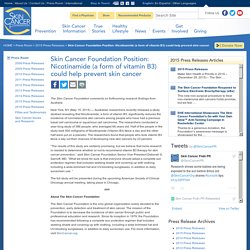
The researchers conducted a year-long study of 386 people, who averaged 66 years old. Half of the people in the study took 500 milligrams of Nicotinamide (Vitamin B3) twice a day and the other half were put on a placebo. The researchers found that people who took vitamin B3 twice a day cut their chances of developing new skin cancers by 23 percent. “The results of this study are certainly promising, but we believe that more research is needed to determine whether or not to recommend vitamin B3 therapy for skin cancer prevention,” said Skin Cancer Foundation Senior Vice President Deborah S. First human clinical study of ChromaDex's NIAGEN nicotinamide riboside meets primary endpoint. ChromaDex Corp.
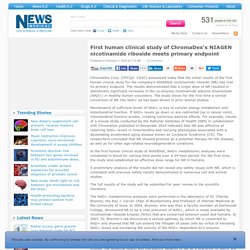
(OTCQX: CDXC) announced today that the initial results of the first human clinical study for the company's NIAGEN® nicotinamide riboside (NR) has met its primary endpoint. The results demonstrated that a single dose of NR resulted in statistically significant increases in the co-enzyme nicotinamide adenine dinucleotide (NAD+) in healthy human volunteers. The study shows for the first time a similar conversion of NR into NAD+ as has been shown in prior animal studies. Maintenance of sufficient levels of NAD+ is key to cellular energy metabolism and mitochondrial function. If NAD+ levels go down or are redirected (as in cancer cells), mitochondrial function erodes, creating numerous adverse effects. In the first human clinical study of NIAGEN®, NAD+ metabolomic analyses were completed in blood for various time points over a 24-hour period. The full results of the study will be submitted for peer review in the scientific literature. Dr. Nobel Laureate Dr. Don't believe the HYPE about Nicotinamide Riboside (Niagen)
A small fraction makes it intact to muscle and other tissues outside Liver The charts at left are from this 2016 study which used mice that have had the gene for Nampt ‘knocked out’ in quadricep muscle, so are unable to process NAM.
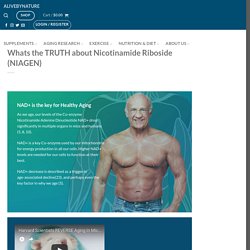
As a result, the NAD+ levels drop to 15% of normal. These mice were fed double labelled NR to track the movement of the NR through the body. Any NR that makes it through digestion intact would be incorporated as double labelled NAD (M+2). NR that has been metabolized to NAM loses 1 heavy tracking molecule and would be found as M+1. Chart D shows both single and double labelled NAD+ (green and red) are abundant in roughly equal amounts in the liver. Chart C shows quite a lot of single labelled NAD+ in the muscle which is from NR that has been metabolized to NAM and then NMN.
We know this NAD+ was metabolized as NAM and then NMN because these mice lacked Nampt in muscle, so can not process NAM. Novel Vitamin Discovery Offers Clues for Cancer Chemotherapy and Lipid Disorders. For Release: May 13, 2004 Contact: DMS Communications (603) 650-1492 Novel Vitamin Discovery Offers Clues for Cancer Chemotherapy and Lipid Disorders HANOVER, NH-Dartmouth Medical School cancer researchers, in a fusion of biochemistry and genetics, have discovered a new vitamin in a molecular pathway central to such vital processes as gene regulation, metabolism and aging.
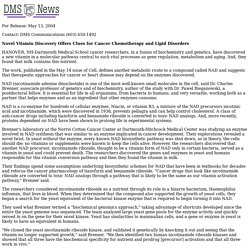
And, they found that milk contains this nutrient. The work, published in the May 14 issue of Cell, defines another metabolic route to a compound called NAD and suggests that therapeutic approaches for cancer or heart disease may depend on the enzymes discovered. NAD (nicotinamide adenine dinucleotide) is one of the most well-known small molecules in the cell, said Dr. NAD is a co-enzyme for hundreds of cellular enzymes. Their findings upend some assumptions underlying biosynthetic schemes for NAD that have been in textbooks for decades and refocus the cancer pharmacology of tiazofurin and benzamide riboside. Derivative of vitamin B3 prevents liver cancer in mice. Liver cancer is one of the most frequent cancers in the world, and with the worst prognosis; according to the World Health Organisation (WHO), in 2012, 745,000 deaths were registered worldwide due to this cause, a figure only surpassed by lung cancer.
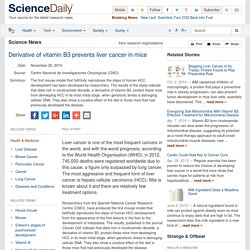
The most aggressive and frequent form of liver cancer is hepato-cellular carcinoma (HCC); little is known about it and there are relatively few treatment options. Researchers from the Spanish National Cancer Research Centre (CNIO), have produced the first mouse model that faithfully reproduces the steps of human HCC development, from the appearance of the first lesions in the liver to the development of metastasis. The results, published in the journal Cancer Cell, indicate that diets rich in nicotinamide riboside, a derivative of vitamin B3, protect these mice from developing HCC in its most initial stage, when genotoxic stress is damaging cellular DNA.